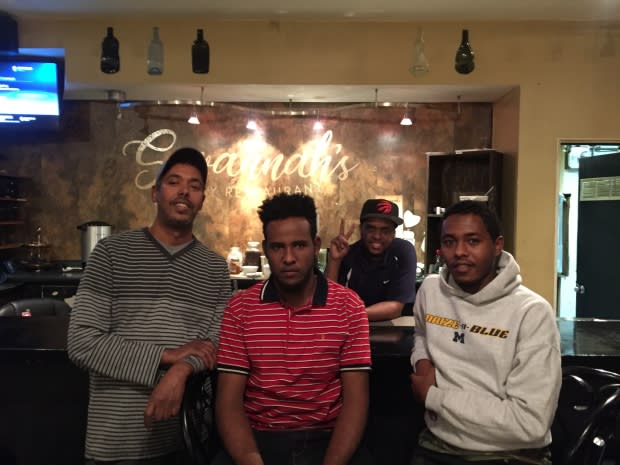'It's a better place to be': What immigration means for the N.W.T.
Mohammed Abdi Hussien saw his first snowfall this week.
"That's the difficult thing I'm having right now is the weather," he said. "We've never experienced anything like this, but we're [going to] get used to it."
The soft-spoken 20-year-old from Nairobi, Kenya, landed with his 17-year-old brother in Yellowknife less than a month ago. They joined their father, who works at a mine in the territory.
The family moved to the Northwest Territories "because it's a better place to be," said Hussien, who works at Savannah's Family Restaurant in downtown Yellowknife.
"People, environment, good jobs, everything is good," he said. "Canada is the place to be."
It's not just immigrants who stand to gain from moving to the N.W.T. From customer service to medical caregiving, attracting and keeping workers in certain sectors in the Northwest Territories is a perennial problem, and observers say immigration is one solution.
While the provinces and territories can nominate potential newcomers, it's the federal government that's in charge of immigration. The election on Oct. 21, could mean changes in the how — and how many — people move to the N.W.T.

'A really high need' for entry-level workers
Staffing is a chronic challenge for many business owners in Yellowknife, according to a recent survey by the Yellowknife Chamber of Commerce.
While the chamber doesn't have a position on immigration, Executive Director Deneen Everett, said "we firmly believe that population growth is critically important for Yellowknife's long-term economic and social success."
Annik Théberge is the francophone immigration network coordinator for Northwest Territories under the Fédération Franco-Ténoise. Part of her job is to attract and retain francophone immigrants.
Both territorial and federal institutions in the Northwest Territories need bilingual workers, said Théberge, and there's "a really high need" for entry-level service workers in the N.W.T.
The territory benefits immigration, she said. "[Immigrants] can contribute positively to the community by bringing their diversity, their expertise."
Théberge said the Northwest Territories can offer a faster path to permanent residency than Ontario or Quebec, but the cold winters, the perceived isolation, and the high cost of living are often deterrents. High prices in the North mean most people who move to the territory for work in entry-level positions have to take on two or three different jobs, she said.

What federal parties propose
This federal election, immigration features prominently in each party's platform. Some candidates want more of it, some want less, and some want the whole process done differently.
The Conservative immigration plan is aimed at attracting "highly skilled" workers, and specifically names the technology sector as one in need of them. The party also says it would encourage new immigrants to consider jobs in rural and Northern communities.
The Liberals say immigrants can help support the aging population and fill gaps in the workforce. The party is promising "modest and responsible increases to immigration," with an emphasis on highly skilled workers. They also plan to introduce a permanent refugee program for human rights advocates and journalists at risk in their home countries.
As part of the Green Party's 19-point immigration platform, it would eliminate the temporary foreign worker program and fill the country's labour needs by increasing immigration. The party also wants "environmental refugee" included as a refugee category.
The People's Party of Canada says it would lower the total number of immigrants and refugees accepted into Canada each year from 350,000 to between 100,000 and 150,000. A People's Party government would assess every prospective immigrant for how well they align with "Canadian values and societal norms." It would also end the family reunification for parents and grandparents of immigrants.
The NDP say they would get rid of backlogs in family reunification and refugee applications. The party would also create a tax credit for graduates who work in designated rural and northern communities.

Training for people who already live here
Not everyone believes immigration is the solution to labour shortages in the territory.
Dene National Chief Norman Yakeleya says that with high unemployment in many communities outside Yellowknife, the focus should be on training people who already live here.
"There needs to be some strategy to have our people work," he said. "We need to look at providing some hope for people."
There needs to be some strategy to have our people work. - Dene National Chief Norman Yakeleya
The last territorial government saw value in attracting new immigrants and committed to working with Ottawa to increase their numbers in the N.W.T. It developed a five-year immigration strategy aimed at bringing in workers to meet labour needs, and at attracting investment through the purchase of local businesses by foreign buyers.
Since 2015, 244 people have immigrated to the territory to fill critical labour gaps, said a spokesperson for the territory's Department of Education, Culture and Employment. The number grows to 397 when dependents are counted.
In about the same period of time, another 11 people have immigrated to territory to operate businesses, and have brought with them 37 family members, said a spokesperson for the Department of Industry, Tourism and Investment.
Ultimately, it's the federal department of Immigration Refugees and Citizenship Canada that decides who gains entry.
For Hussein at Savannah's Family Restaurant, getting here wasn't easy. He said the whole process took between five and seven years.
"The process was too long," he said, "but thank god we are here right now. We overcome everything."


